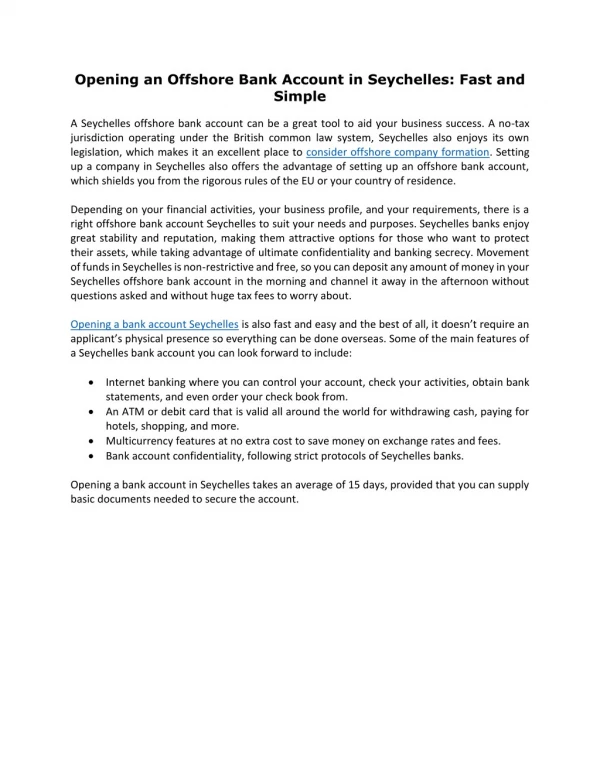Offshore Company Formations and AML/KYC Rules: Staying Legally Safe
How Offshore Firm Formations Job: A Step-by-Step Review for Business Owners
Offshore business formations can offer considerable benefits for business owners looking for tax obligation optimization and possession protection. The procedure involves multiple crucial actions, starting with cautious territory choice and comprehensive documentation preparation. Involving expert services is necessary for compliance. Many forget the continuous duties that adhere to preliminary registration. Comprehending these intricacies can make a substantial distinction in leveraging offshore opportunities properly. The next steps are important for lasting success.
Understanding Offshore Companies: What They Are and Why They Matter
Although the concept of offshore firms may seem complicated, recognizing their fundamental nature and significance is important for both companies and people looking for to maximize their monetary approaches. Offshore companies are entities registered outside the person's nation of house, usually in jurisdictions that provide positive regulatory atmospheres. These services can supply numerous benefits, such as tax obligation optimization, asset protection, and enhanced personal privacy.
For business owners, establishing an overseas firm can promote global trade, lower functional prices, and expand market reach. In addition, overseas business usually enable streamlined compliance with global policies. Individuals might also utilize offshore structures to protect personal possessions from political or economic instability in their home nations. Ultimately, the allure of offshore business hinges on their capacity to boost monetary versatility and supply critical advantages in a significantly interconnected international economy - Offshore Company Formations. Recognizing their functional structure and benefits is crucial for making educated decisions
Picking the Right Jurisdiction for Your Offshore Business
Selecting the ideal territory for an offshore firm is important for optimizing tax advantages and making sure compliance with neighborhood policies. Various jurisdictions use varying tax obligation rewards and governing settings that can considerably influence business operations. A careful evaluation of these variables is essential for informed decision-making.
Tax Advantages Review
When considering the establishment of an offshore company, comprehending the tax obligation advantages connected with numerous territories is important. Different places use one-of-a-kind benefits, such as reduced or absolutely no company tax obligation prices, which can greatly boost profitability. Some jurisdictions offer tax obligation incentives for specific kinds of services, bring in business owners looking for minimized tax obligation obligations. Furthermore, certain nations apply favorable tax treaties that minimize double taxes on global revenue, ensuring that businesses preserve even more earnings. The choice of territory additionally affects value-added tax (VAT) and other local tax obligations. Business owners must evaluate these variables carefully to pick a place that lines up with their company objectives, maximizing tax obligation performance while staying compliant with international laws.
Regulatory Atmosphere Considerations
Selecting the right territory for an offshore company calls for a comprehensive understanding of the governing setting, as different countries enforce varying degrees of conformity and administration. Entrepreneurs need to evaluate factors such as legal structures, tax regulations, and reporting commitments. Jurisdictions like the British Virgin Islands and Cayman Islands are usually favored for their business-friendly regulations and minimal reporting needs. Conversely, some countries might enforce strict laws that might make complex operations and boost costs. Furthermore, the political stability and online reputation of a territory can impact the long-lasting stability of the offshore company. Mindful factor to consider of these governing facets is vital to ensure that the selected jurisdiction lines up with the business's calculated objectives and operational needs.
Preparing the Required Documentation
Preparing the required documentation is an essential step in the offshore company development procedure. Entrepreneurs must gather various lawful and identification files to facilitate their firm's establishment in a foreign territory. Generally, this consists of a thorough organization plan outlining the business's objectives and functional methods. Furthermore, personal identification documents, such as tickets or motorist's licenses, are called for from the firm's supervisors and shareholders.
Oftentimes, proof of address, like energy expenses or financial institution declarations, is required to validate the identifications of the entailed events. Moreover, particular forms dictated by the jurisdiction, including application for enrollment, should be completed accurately. Some territories may also call for a statement of the nature of business activities and conformity with local policies. Completely preparing these records assures a smoother registration procedure and aids reduce potential hold-ups or difficulties, eventually establishing a solid foundation for the overseas entity.
Involving Professional Services for Offshore Development
Involving professional services in overseas formation can greatly enhance the effectiveness and efficiency of the procedure. Entrepreneurs frequently deal with intricacies that can be frustrating, making skilled advice very useful. Expert companies concentrating on offshore formations supply a wide range of knowledge regarding jurisdiction option, business framework, and regional market conditions.
These specialists can aid in composing crucial documentation, guaranteeing accuracy and compliance with specific requirements. They additionally aid simplify interaction with local authorities, lowering the chance of hold-ups or misunderstandings. Additionally, specialist solutions can use insights right into critical benefits, such as tax advantages and property defense, customized to the entrepreneur's particular needs.
Navigating Regulatory Compliance and Legal Demands
Comprehending the governing landscape is vital for entrepreneurs beginning on offshore company developments. Conformity with worldwide regulations and regional legislations is important to stay clear of legal pitfalls. Each territory has specific requirements relating to company registration, reporting, and tax, which should be extensively investigated.
Entrepreneurs need to acquaint themselves with the policies governing business framework, possession, and operational methods in the chosen offshore area. Furthermore, anti-money laundering (AML) and know your client (KYC) policies commonly use, requiring appropriate documents and confirmation processes.
Engaging with legal experts that specialize in offshore solutions can provide very useful advice on navigating via these complexities. Ensuring conformity not just shields the business from prospective lawful issues however additionally enhances integrity with regulatory authorities, companions, and financiers. By sticking to the prescribed lawful frameworks, entrepreneurs can efficiently utilize the benefits of offshore company formations while reducing dangers related to non-compliance.
Establishing Banking and Financial Accounts

When an appropriate financial institution is recognized, business owners generally require to prepare and send various files, consisting of evidence of identification, service registration records, and a summary of the intended business activities. (Offshore Company Formations)
Some banks might likewise require a minimal deposit to open up an account. Business owners should be prepared to answer questions relating to the resource of go to website funds and organization operations. By thoroughly recognizing the financial landscape and adhering to the bank's demands, entrepreneurs can safeguard their offshore firm has seamless access to essential economic solutions for efficient procedure.
Preserving Your Offshore Business: Ongoing Responsibilities and Finest Practices
Maintaining an overseas company entails numerous continuous responsibilities that are crucial for compliance and operational stability. Key facets include sticking to annual compliance needs, keeping precise economic documents, and comprehending tax responsibilities. These components are vital for making sure the firm's long life and lawful standing in its jurisdiction.
Annual Compliance Demands
While establishing an overseas firm offers many advantages, it likewise requires ongoing responsibilities that can not be ignored. Yearly conformity requirements differ by jurisdiction yet usually consist of sending annual returns and economic declarations to neighborhood authorities. Companies have to additionally pay yearly costs, which can include registration renewals and tax obligations, depending on the area. Additionally, many territories call for keeping a registered workplace and a neighborhood representative. Failing to adhere to these regulations can cause charges, including penalties or also dissolution of the firm. Business owners need to likewise recognize any kind of changes in neighborhood laws that may affect their visit here conformity obligations. Staying notified and organized is crucial for maintaining the benefits of an overseas company while meeting lawful duties properly.
Preserving Financial Records
Compliance with yearly demands is just component of the continuous obligations connected with offshore company management. Keeping exact monetary records is vital for guaranteeing openness and accountability. Entrepreneurs need to methodically document all deals, including income, expenses, and possessions. This method not just aids in interior decision-making but additionally prepares the company for possible audits from regulatory authorities.
Regularly updating economic declarations, such as profit and loss accounts and equilibrium sheets, is important for tracking the business's economic health. Using audit software program can streamline this procedure, making it less complicated to maintain and generate reports compliance. Additionally, entrepreneurs need to consider seeking professional accountancy solutions to ensure adherence to neighborhood regulations and best practices, thus protecting the stability and track record of their overseas operations.

Tax Obligation Responsibilities Review
Guiding with the complexities of tax commitments is essential for the effective administration of an overseas business. Entrepreneurs must understand the tax obligation guidelines of both their home country and the territory where the overseas entity is established. Conformity with local taxation regulations is important, as failure to adhere can bring about charges or legal issues. Routinely submitting required tax returns, even when no tax obligation may be owed, is usually called for. Additionally, preserving accurate and updated monetary records is important for showing conformity. Seeking recommendations from tax specialists aware of global tax law can assist browse these responsibilities efficiently. By applying finest techniques, entrepreneurs can assure that their offshore operations continue to be legally certified and financially sensible.

Frequently Asked Inquiries
How much time Does the Offshore Firm Development Refine Normally Take?
The overseas company development procedure generally varies from a few days to numerous weeks. Factors influencing the timeline consist of jurisdiction, paperwork demands, and responsiveness of lawful and financial institutions associated with the arrangement.
What Are the Costs Related To Keeping an Offshore Firm?
The costs associated with maintaining an offshore business can differ extensively. They usually consist of yearly enrollment charges, conformity prices, accounting services, and feasible legal fees, depending on the territory and certain organization tasks included.
Can I Open Up a Personal Savings Account for My Offshore Business?
Opening an individual financial institution account for an overseas company is generally not permitted. Offshore accounts must be service accounts, mirroring the business's activities, therefore adhering to regulations and guaranteeing proper monetary monitoring and legal responsibility.
Exist Constraints on Foreign Ownership of Offshore Firms?

What Happens if I Fail to Follow Offshore Rules?
Failure to abide with offshore guidelines can bring about serious fines, including substantial fines, loss of content organization licenses, and potential criminal fees. Additionally, non-compliance might result in reputational damage and problems in future company operations.
Offshore firms are entities registered outside the individual's country of house, frequently in territories that offer positive regulatory environments. Choosing the ideal jurisdiction for an offshore business is important for making best use of tax benefits and making sure compliance with regional laws. When thinking about the facility of an overseas firm, recognizing the tax obligation advantages associated with various jurisdictions is crucial. Choosing the best jurisdiction for an offshore business needs a thorough understanding of the regulatory environment, as various nations enforce differing degrees of conformity and administration. In addition, the political security and credibility of a jurisdiction can affect the long-term viability of the overseas business.